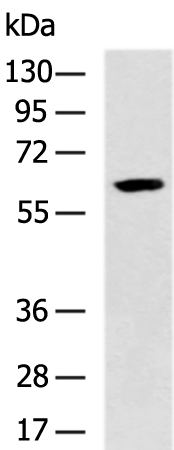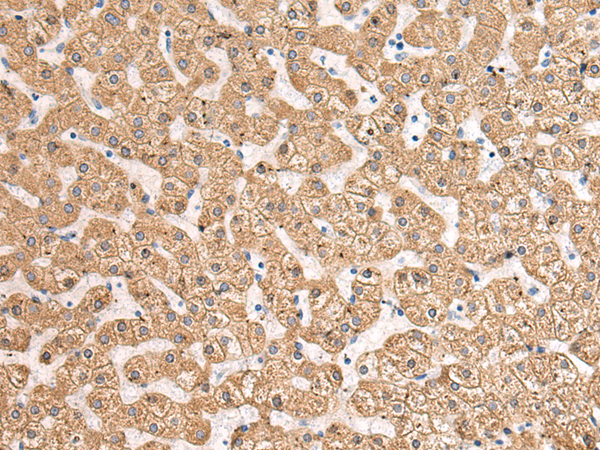

| WB | 1/500-1/1000 | Human,Mouse,Rat |
| IF | 咨询技术 | Human,Mouse,Rat |
| IHC | 1/50-1/100 | Human,Mouse,Rat |
| ICC | 1/50-1/200 | Human,Mouse,Rat |
| FCM | 咨询技术 | Human,Mouse,Rat |
| Elisa | 1/10000 | Human,Mouse,Rat |
| Aliases | CEH; REH; TGH; ACAT; CE-1; CES2; HMSE; SES1; HMSE1; PCE-1; hCE-1 |
| WB Predicted band size | 63 kDa |
| Host/Isotype | Rabbit IgG |
| Antibody Type | Primary antibody |
| Storage | Store at 4°C short term. Aliquot and store at -20°C long term. Avoid freeze/thaw cycles. |
| Species Reactivity | Human |
| Immunogen | Fusion protein of human CES1 |
| Formulation | Purified antibody in PBS with 0.05% sodium azide and 50% glycerol. |
+ +
以下是关于TSG101抗体的3篇代表性文献示例(供参考,建议通过学术数据库核实具体信息):
---
1. **标题**:*TSG101 interaction with HRS mediates endosomal trafficking and receptor down-regulation*
**作者**:Lu Q, et al.
**摘要**:研究TSG101在ESCRT-I复合体中的作用,利用TSG101抗体进行免疫共沉淀实验,揭示了其与HRS蛋白相互作用调控内体分选及膜受体降解的分子机制。
---
2. **标题**:*The tumor susceptibility gene TSG101 regulates cell cycle progression and apoptosis*
**作者**:Li L, et al.
**摘要**:通过TSG101抗体检测癌细胞系中TSG101的表达水平,发现其缺失导致细胞周期异常和凋亡抵抗,提示其在肿瘤抑制中的潜在功能。
---
3. **标题**:*HIV-1 budding utilizes a cellular complex containing TSG101 and VPS4*
**作者**:Garrus JE, et al.
**摘要**:使用TSG101特异性抗体阻断实验,证明TSG101在HIV病毒颗粒出芽过程中不可或缺,为靶向ESCRT通路的抗病毒策略提供依据。
---
**备注**:以上为示例性文献,实际引用时建议通过PubMed或Google Scholar以“TSG101 antibody”为关键词检索,并筛选涉及抗体应用(如WB、IP、IHC等)的研究。
The tumor susceptibility gene 101 (TSG101) encodes a multifunctional protein involved in membrane trafficking, cell cycle regulation, and viral budding. Initially identified as a tumor suppressor, TSG101 is a critical component of the endosomal sorting complex required for transport (ESCRT) machinery, which mediates ubiquitin-dependent sorting of cargo proteins into multivesicular bodies (MVBs) and facilitates membrane scission events. TSG101 antibodies are essential tools for studying these processes, enabling detection and localization of TSG101 in various experimental contexts, such as Western blotting, immunoprecipitation, and immunofluorescence.
Research using TSG101 antibodies has elucidated its role in diverse cellular pathways, including cytokinesis, autophagy, and HIV-1 viral particle release, where it interacts with viral proteins like HIV-1 Gag. Dysregulation of TSG101 is linked to cancers, neurodegenerative diseases, and immunodeficiency disorders, highlighting its therapeutic relevance. Commercially available TSG101 antibodies vary in clonality (monoclonal/polyclonal), epitope specificity, and host species, requiring careful validation for target applications. Recent studies also explore TSG101's dual role as both a tumor suppressor and potential oncogene, depending on cellular context and mutation status. Its involvement in exosome biogenesis further underscores its importance in intercellular communication and cancer metastasis. TSG101 remains a focal point in understanding ESCRT-mediated mechanisms and their implications in disease pathogenesis.
×